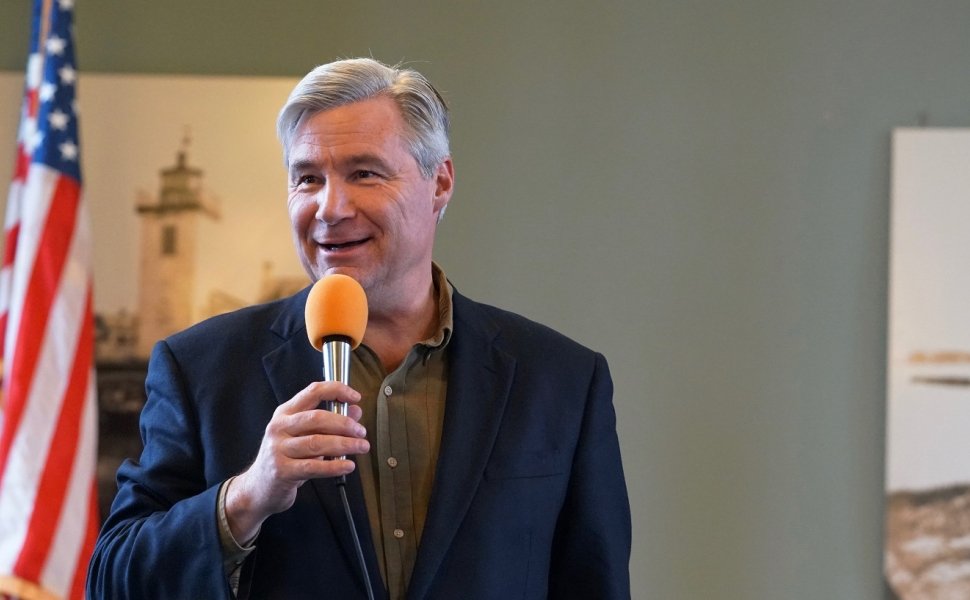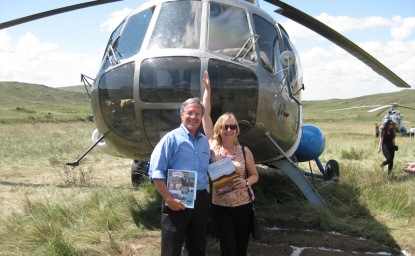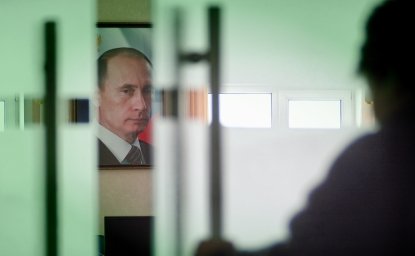This transcript has been lightly edited for clarity.
Jill Dougherty: From the Kennan Institute in Washington, D.C., welcome to KennanX, a podcast on our never-ending quest to understand Russia, Ukraine, and the surrounding region. I'm your host, Jill Dougherty.
***
Senator Sheldon Whitehouse: We’ve been unable to clear dark money out of our politics, because of this problem of internal dark money influence. And it creates just an open avenue for a Putin, for the Iranians, for the Chinese, and for others, using very simple techniques of deception to get into our politics and play from behind masks.
***
Jill Dougherty: International competition can be waged with ideology, propaganda, diplomacy, even military arms. But there’s another weapon that can be even more effective: corruption. Corruption is endemic in many of the countries we focus on in this podcast: Russia, Central Europe, Central Asia. But the internal corruption that plagues these countries has not only metastasized, it’s been weaponized – transformed into what experts call “strategic corruption.” And that has Senator Sheldon Whitehouse, Democrat from Rhode Island, senior member of the Senate Judiciary Committee, and author of a new book on so-called dark money, deeply concerned.
***
Senator Sheldon Whitehouse: One of the things that I see right now is that America is involved in what Samuel Huntington famously called a clash of civilizations. I think the clash of civilizations is a different one than what Huntington described. I think we have a clash of civilizations between rule of law and justice and countries that support rule of law and justice, and corruption and criminality and countries that have been overwhelmed by corruption and criminality.
And in that clash between these two civilizations, one of corruption and one of rule of law, this question of how leaders compensate themselves by corrupting and how our rule of law world helps and protects them when they corrupt their own countries, has vital national security significance and also is really an important emblem for the United States, you know, city on a hill?
Jill Dougherty: Mm-hmm.
Senator Sheldon Whitehouse: We're not much of a city on a hill when we're aiding and abetting international corruption. So it matters to me at that high level: what are we as Americans, what does America mean to the world, and how do we defeat corrupt adversaries?
Jill Dougherty: Our podcast is about Russia, obviously, and when you say the word Russia, often the word corruption comes right after that.
Senator Sheldon Whitehouse: It does indeed. Well, I'd start by saying that in Russia, as in other corrupted countries, corruption is the tool for suppressing Russians. When a country goes corrupt, there is enough to steal by those in power, that they can use those resources to crush dissent and to assure the continuation of their corrupt power.
So in Russia's case, they don't content themselves just with keeping power through corruption. They also use corruption to push influence in other countries. It's actually formally part of their security policy through the Gerasimov doctrine, to go out and use corruption to undermine other countries, to push political dissent in other countries, and to try to bring other countries under their sway using the force of corruption to their advantage.
Jill Dougherty: You know, I think a lot of Americans have this impression of corruption as Putin getting rich, Putin - the richest man in the world, et cetera.
Senator Sheldon Whitehouse: More than that-
Jill Dougherty: You’re talking really about, I guess strategic corruption.
Senator Sheldon Whitehouse: Correct.
Jill Dougherty: Undermining governments, undermining citizen's ability to participate.
Senator Sheldon Whitehouse: Correct.
Jill Dougherty: So could you walk me through that? I'm thinking, let's say, especially in Europe and Eastern Europe, former areas or under the influence of the Soviet Union, you find a lot of that of Russians buying up politicians-
Senator Sheldon Whitehouse: Yes.
Jill Dougherty: -and influencing things.
Senator Sheldon Whitehouse: Well, you saw lots of traces of Russian influence in elections. And when you looked at the dark money groups that were influencing elections in favor of Russia, you can't necessarily prove the Russian money, because by virtue of being a dark money group, they've hidden who their backers are. But when the beneficiary of it is Russia, then I think you can draw the logical conclusion. And of course, in American law, if somebody's keeping something secret, then the inference that it's wrongful behavior goes against them. And so I think when their political groups are taking huge gobs of anonymous money and stumping for Russia, it's perfectly fair and logical to conclude that is a Russian influence campaign, particularly when that aligns, again, with what Russia has defined as its own influence effort.
So you see it all over the place. You even saw it in the United Kingdom with respect to the Brexit. Obviously, the more that Putin can break up foreign institutions and organizations and put the UK on odds with the EU, the better off he and his country are. So yes, the simpler thing is to enrich the leaders of the country. The secondary thing is to empower them to stay in power, not withstanding the fact that they are basically running a corrupt establishment. That's how they keep their internal power. And the third is, it's how they project power by disabling adversaries. And in this case, we, the Atlantic Alliance, NATO and the EU, were all adversaries.
Jill Dougherty: Mm-hmm. You know, I grew up in the Cold War and you did too. So I'm thinking back in the old Soviet days, there was a lot of use of money, I'm thinking, maybe on micro scale. One example would be literally taking physical dollars and paying groups to demonstrate protests on the streets or have some type of influence in that very direct way. So I guess my question is, is Russia still doing what they did in the Soviet Union days? Or do we have something that is even more modern, complex?
Senator Sheldon Whitehouse: I think you're right that it is more modern and complex than slipping money to groups to go out and do a demonstration. It's become much more systematic. If you look back at the Trump campaign for instance, you saw really systematic efforts by Russia to damage Clinton and help Trump. The Mueller report and multiple successful prosecutions and plea agreements confirm that Russia was trying very hard to influence our election. It goes beyond just Facebook taking payment in rubles for political ads. People actually accepted criminal responsibility for participating in Russian intelligence, I think, efforts. You see it quite broadly through permitted criminal activity by cyber hackers and so forth. Again, anything to disrupt the United States of America.
So it's a very, very broad array, and I firmly believe that it is consistent with Kremlin policy at the highest levels to operate in every conceivable frequency. In fact, you're better off if you spread the effort across 10 or 15 different ways of trying to create division and dissension in your adversary’s country, because you're not dependent on one, and it's easier not to get caught.
Jill Dougherty: Of course the question is what do you do about this? And I did notice, I think it was in May, that the Senate passed a bill - about a hundred million dollars to help the Treasury Department's Financial Crimes Enforcement Network.
Senator Sheldon Whitehouse: Yes.
Jill Dougherty: What is that exactly? What does that money do?
Senator Sheldon Whitehouse: So that network is, is informally known as FinCEN and they’re the anti-money laundering group within Treasury that tries to track money laundering, originally stood up to help police the banking industry when we first put anti-money laundering banking regulations in. But as we added restrictions on shell corporations’ secret behavior in the US, the so-called beneficial ownership law, FinCEN was given new responsibilities there.
And as the Ukraine conflict developed and the Biden administration stood up the Kleptocracy Initiative, that combines Treasury [Department] and Department of Justice and State [Department] and the intelligence community in trying to deal with oligarch and other money laundering efforts. FinCEN's role has grown a bit beyond its initial banking money laundering role, and it's now addressing more broadly this concern that I started with about how kleptocracy and crime are, I guess, non-civilization on the other side of our clash of civilizations.
Jill Dougherty: Is that what is called the Klepto Capture?
Senator Sheldon Whitehouse: Yes, Klepto Capture is the name for that. “Kleptocracy Initiative” was its original name within the Department of Justice, and as they expanded it to include these other agencies, it became Klepto Capture.
Jill Dougherty: All right. That sounds very cool, obviously, and we've seen pictures, especially as the Ukraine war has dragged on, of seizing yachts and all of that.
Senator Sheldon Whitehouse: Yeah.
Jill Dougherty: It looks exciting, but really what does that do - to seize some rich Russian’s yacht?
Senator Sheldon Whitehouse: Well, if you look at the history of Ukraine, it was when the Ukrainian oligarchs turned on the Moscow puppet president that the president fled to Russia, of course, and the Ukrainian Maidan Revolution burst forward, and we moved to the type of relationship with the West that has caused Russia to fear it so much that they attacked it. We have an actual, practical experience of when the oligarchs turn on a leader, it can actually change the direction of the country – it’s regime change.
With Putin, he has done more work to shore up his leadership. The stool of his leadership stands on several legs. And one of the legs is the support of the Russian oligarchs who participated in the looting of the country and the corruption of the government. And to the extent that you can degrade that leg, then that means he has to lean further on his internal security establishment and on the military, and as they in turn, also get degraded, it puts Putin in a more vulnerable position. But the oligarch network that supports him and that he, in turn supports, has taken some punishment from this, and that is in the long-term interest of degrading his power and his brutal and murderous aspirations.
Jill Dougherty: Looking forward on this, you know, Russia's economy is being affected by sanctions, there's no question. However, Putin has ways of switching around money and taking it from certain areas, putting it to others. For instance, right now they're putting a lot of money into weapons and armaments to prosecute the war. Looking down the road, maybe short-term here, but are there different ways that they are going to try to avoid sanctions? Protect the money that they do have? And anything that you have a red flag on right now to watch in terms of the influence of corruption?
Senator Sheldon Whitehouse: Yes. I think the red flag is fossil fuel. My beloved friend John McCain, when he was a colleague, used to refer to Russia as a gas station run by gangsters with an army. It was one of the reasons that he was one of the first people that Putin sanctioned, because John was all over his case early on, and I think he's dead right. And the gas station piece - there are very few countries for whom oil and gas are a more important part of their economy than for Russia, particularly with respect to international trade. And as punishing as the sanctions have been, the rise in prices for oil and gas internationally have been a countervailing effect, providing more revenues into the Russian government to continue to propagate its war.
And our un-friends in Saudi Arabia and in OPEC, by virtue of crunching output and driving up price, are propping up Putin and countering the sanctions in a way that is obviously helpful to them, but is particularly helpful to Putin. In fact, it's kind of salvaged his economy against the pressure of the sanctions. Granted that it's down a lot, but it would be down a lot more had the international oil cartel not come to his rescue in this way. And Putin himself has been putting pressure on the European countries that he sells oil and gas to by threatening to cut it off and using the pressure of concerned consumers against their governments to his advantage to try to knock down support for Ukraine. It hasn't worked yet, but it's been an effective tool for him, and thankfully our European allies have withstood it so far.
Jill Dougherty: Do you feel that the United States and its allies have enough, let's call it, transparent vision into that system?
Senator Sheldon Whitehouse: No, we have a lot of work to do, we expanded from the banks with anti-money laundering to shell corporations with the beneficial ownership bill. We're fighting right now to try to get hedge funds and other investment groups, and folks that deal with very high-end real estate and so forth, to have to report similarly in the United States. And we're getting resistance from those organizations, trade associations saying, “No, no, no. We make a lot of money here, don't make us disclose our corrupt foreign clients.”
So, you know, we're nowhere near as far along as we should be. Specifically, in terms of political influence. There are enormous American internal advocacy groups, particularly the fossil fuel industry that use what we call dark money, political money that can't be traced back to its original source, in order to control domestic politics.
The reason we can't do anything about climate change is because of fossil fuel dark money. And those groups are fighting disclosure with every tool that they have, because they want to be able to protect their own dark influence in America. And the fact that Putin and potentially other foreign dictators are riding along with them, it causes them, apparently no discomfort whatsoever.
So we've been unable to clear dark money out of our politics, because of this problem of internal dark money influence. And it creates just an open avenue for a Putin, for the Iranians, for the Chinese, and for others, using very simple techniques of deception, to get into our politics and play from behind masks.
Jill Dougherty: Hmm. Well, Senator Sheldon Whitehouse, thank you very much. It was an enlightening but disturbing discussion, so appreciate your time.
Senator Sheldon Whitehouse: Thank you, Jill. Good to be with you. The good news in all of it is that the more transparency we can bring to bear, the more we can solve this problem and the better off we'll all be.
***
Jill Dougherty: Ukraine is one of the countries that’s been plagued by corruption. The government has been taking some steps to fight it, but not enough. War creates even more opportunities for corruoption, and when eventually Rusisa’s War against Ukraine ends, and the rebuilding of the country begins, massive amoutns of money will flow into Urkaine. And that will be a new and even greater opportunity for corruption.
How Ukraine deals with corruption – whether it roots it out or allows it to fester – will be crucial, not only for providing funds to restore shattered infrastructure, but to avoid undermining financial and political support from Western partners. As Ambassador Norm Eisen and Josh Rudolph put it in a new article on the German Marshall Fund website, “if we do not significantly impair the ability of oligarchs and kleptocrats to plunder the economy that emerges from this war, there may not be a recovery on the scale that the Ukrainian people have earned.”
***
KennanX is a product of the Kennan Institute at the Woodrow Wilson International Center for Scholars in Washington, D.C. It is the Wilson Center’s oldest program, founded in 1974 by George F. Kennan, American statesman, James Billington, historian and former Librarian of Congress, and historian S. Frederick Starr. Inspired by them, the Kennan Institute’s mission is to improve America’s understanding of Russia and the wider region. Thanks for listening.









